Carolina Demographics
Keep up with our latest demographic insights
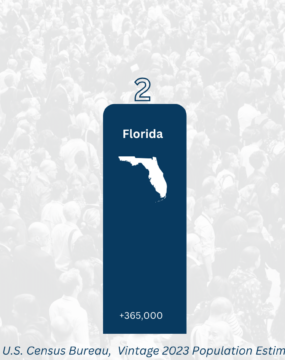
Dr. Michael Cline is the state demographer for North Carolina at the Office of State Budget and Management and has given us permission to re-post his content here. The original version of this piece is here. Once again, North Carolina added more people in the last year than any other state except Texas and Florida. According to the US Census Bureau’s latest population estimates, an additional 140,000 people were added to the permanent resident population…
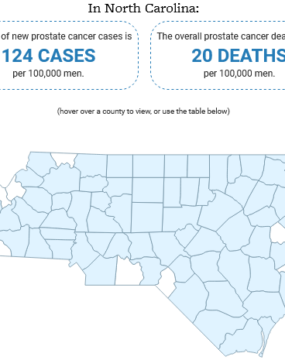
Today we are proud to launch an interactive web-based tool aimed at raising awareness and addressing disparities related to prostate cancer in North Carolina. Created in conjunction with the UNC Men's Health Program, the Prostate Cancer Across North Carolina tool provides a detailed, county-by-county map view of prostate cancer cases and deaths, offering valuable insights for local and state organizations as well as the public. "By offering detailed insights into new cases and mortality rates…

Dr. Michael Cline is the state demographer for North Carolina at the Office of State Budget and Management and has given us permission to re-post his content here. The original version of this piece is here. The official population estimates for counties and municipalities are now available. These population estimates were produced by the State Demographer in the Office of State Budget and Management and are used for analysis and planning. In addition, these estimates…
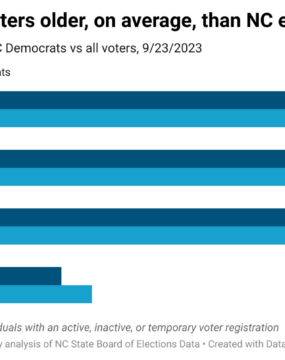
This is part of our series looking at NC’s registered voters. Other stories include an in-depth look at NC’s Republican voters and an in-depth look at NC’s unaffiliated voters. This is an update of our story from October 2022. As of September 23rd, 2023, North Carolina had 7.3 million registered voters. Of these, 2.4 million or 32.89% were registered as a Democrat. Age Older voters are the most likely to register as a Democrat, partly…
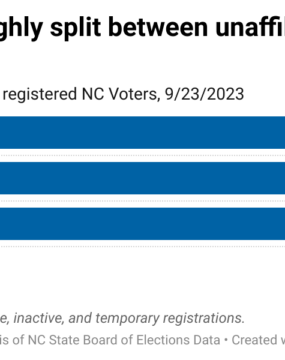
This is the first in a four-part series on North Carolina’s voters. Today, we take a look at North Carolina’s 7.3 million registered voters. In the coming days, we will take a look at North Carolina’s registered Republicans, Democrats, and Unaffiliated Voters, respectively. As of September 23rd, 2023, North Carolina had about 7.9 million voting-eligible adults and 7.3 million registered voters. Their partisan affiliation was roughly split between three groups: unaffiliated, Democrat, and Republican, with…
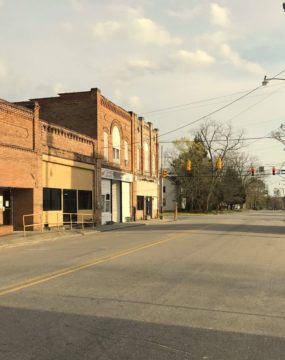
There are many reasons for choosing to live with a partner without marrying or prior to getting married, including financial reasons or to test the relationship prior to marriage. In demography, we refer to unmarried romantic partners living together using the term cohabitation. Fifty years ago, it was very rare to live with an unmarried partner. Only 0.1 percent of 18-24-year-olds and 0.2 percent of 25- to 34-year-olds lived with an unmarried partner in…
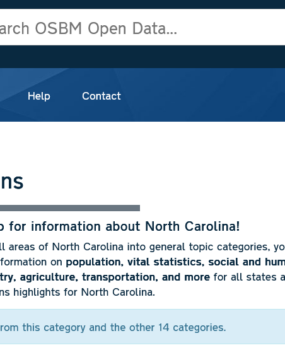
Are you curious how North Carolina ranks among the states for statistical categories like population, education, government, employment, agriculture, transportation, and more? The newly-updated 2023 How NC Ranks data tool from the NC State Data Center (NC SDC) and NC Office of State Budget and Management (NC OSBM) provides data visualizations highlighting selected data points for the US and North Carolina Notably, the tool also provides historical data, which allows analysis and comparisons over time.…

The number of babies born each year in North Carolina, as well as the United States, has been dropping. We published a piece on the topic two years ago when provisional numbers were first released about birthrates during the 2020 pandemic. Since then, the final data has been released. (If you read both this piece and the piece we wrote earlier, you’ll notice that percentages are slightly different – that piece was based on…

Achieving a complete and accurate count in the U.S. Census is not simple. The biggest challenge in conducting the census is getting households to mail back or complete their forms online or by phone, a process known as self-response. Higher self-response rates reduce the overall costs of conducting the census. And, when individuals self-respond, the data is more accurate. Before the 2020 Census, Carolina Demography partnered with the NC Counts Coalition to create a map…

Dr. Michael Cline is the state demographer for North Carolina at the Office of State Budget and Management and has given us permission to re-post his content here. On May 25, 2023, the US Census Bureau published the Demographic Profile and Demographic and Housing Characteristic (DHC) datasets for the 2020 Census. These datasets provide a more expansive picture of the population counted in the 2020 Census than the 2020 Census data published to date. From…
Your support is critical to our mission of measuring, understanding, and predicting population change and its impact. Donate to Carolina Demography today.